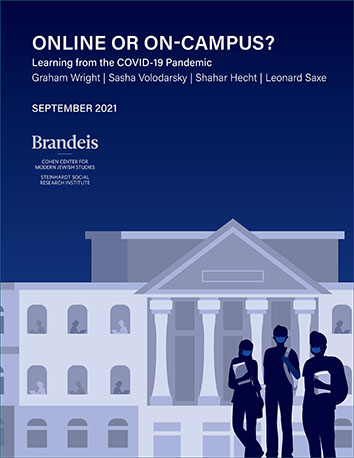Online or On-campus: Learning from the COVID-19 Pandemic
Graham Wright, Sasha Volodarsky, Shahar Hecht, and Leonard Saxe
September 2021
 In this study, we use the disruptions of the COVID-19 pandemic to investigate long-standing questions about the role of the physical campus in the undergraduate college experience. The findings are based on survey data collected in spring 2021 from random samples of undergraduate students at three elite, private universities in the Northeast: Brandeis University, Boston College, and Northeastern University. We examined how physical and virtual campus experiences at the three schools related to students’ perceptions of the quality of instruction and faculty engagement, their sense of belonging at their school, and their overall assessment of their mental health.
In this study, we use the disruptions of the COVID-19 pandemic to investigate long-standing questions about the role of the physical campus in the undergraduate college experience. The findings are based on survey data collected in spring 2021 from random samples of undergraduate students at three elite, private universities in the Northeast: Brandeis University, Boston College, and Northeastern University. We examined how physical and virtual campus experiences at the three schools related to students’ perceptions of the quality of instruction and faculty engagement, their sense of belonging at their school, and their overall assessment of their mental health.
Key Findings
- Students who attended in-person classes at least once a week were more satisfied with the quality of the instruction at their school and were less likely to be bored in class, compared to those who never had in-person classes or had them only rarely.
- Students who attended in-person classes regularly were also more likely to say that the faculty were responsive, that their contributions in class were valued, and that their classes inspired them to think in new ways.
- Students who attended in-person classes regularly, as well as those who participated in group activities like sports or clubs, and those who lived with other roommates (on or off campus), as opposed to alone or with parents, were more likely to say that they “belonged” at their school.
- Socializing frequently with friends from school in person was associated with a greater sense of belonging at school, however, socializing frequently with friends online was not.
- During the 2021 spring semester, mental health was a problem for many students, whether they were learning in person or online, and was most pronounced among students who felt lonely.
- In-person or online socializing by itself did not alleviate mental health difficulties. The more important bulwark against these difficulties was having a robust social support network of friends and family who could provide support and assistance in times of trouble.
- Existing social inequalities related to race, gender and sexual orientation remain salient in higher education: The majority of Black students at these schools did not feel well integrated into the campus community. LGBTQ+ students were also less likely to feel they fully belonged on their campus and more likely than straight, cis-gendered students to report mental health difficulties.